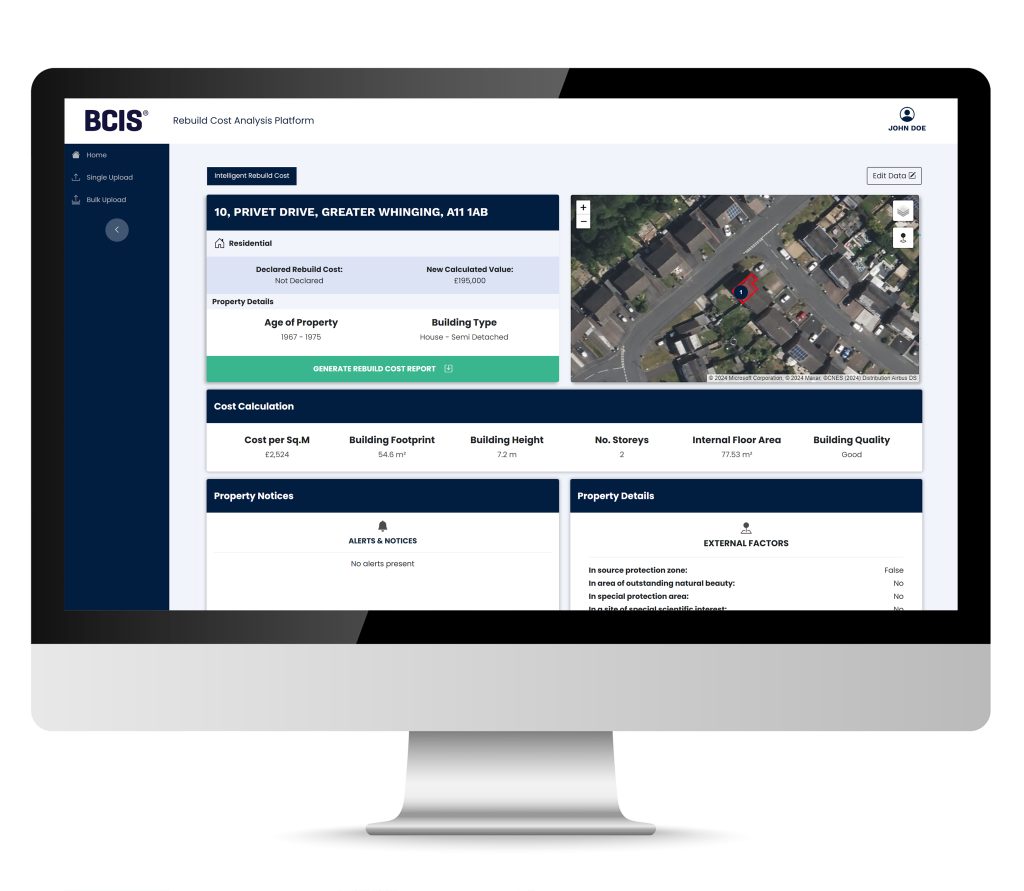Underinsurance is a persistent problem that leaves property owners vulnerable to significant losses, often caused by something as simple as an outdated reinstatement value.
To address the growing issue of underinsurance head-on, the Building Cost Information Service (BCIS), which has more than 60 years’ experience in collating and analysing construction costs, has partnered with risk management firm Intelligent AI to provide a service that produces reinstatement cost assessments at the touch of a button.
The BCIS Intelligent Rebuild Cost Platform draws from multiple data sources to create rebuild cost reports for residential and commercial properties, including BCIS reinstatement data, planning applications and satellite imagery.
Crucially the platform can report on everything from individual residential properties to multi-billion-pound commercial portfolios, enabling annual assessments where previously a rolling-check every three or four years might have been all that was possible.

James Fiske, BCIS CEO, said: “We help property professionals to not only access high-quality data, but to understand the most appropriate data for them. Sadly it’s not uncommon to find unreliable sources of data being used to inform sometimes major business decisions.
“This could be a property owner simply using market valuations for declared reinstatement values, or using inappropriate indices, like general inflation, to estimate movement in rebuild costs. In some larger organisations, there can be issues with data management where figures have been passed between teams, have come through an acquisition, or nobody is quite sure what the original source is.
“The use of problematic data is of course not limited to reinstatement values, but the financial risk in this area could be the most significant one a property owner or portfolio manager has, if they are exposed to considerable loss through underinsurance. On the flip side, having a clearer view of the rebuild costs also helps to avoid overinsurance, and overpaying on a policy.”
BCIS polled more than 200 professionals, predominantly from surveying and insurance roles, and asked what factors they thought contributed most to incorrect reinstatement valuations.
More than one-third (36%) said a lack of regular re-evaluations, 24% said changes in construction costs, and 20% said inaccurate initial assessments.
Fiske said: “We know policyholders want to be adequately covered, but annual site visits for a whole portfolio may be unfeasible. From portfolio managers using IRCP to perform an immediate risk assessment to surveyors using pre-populated assessments as a starting point, the intention is to improve efficiencies, save time, and reduce risk for everyone in the process.”
Using reliable, verified data is crucial to reducing instances of underinsurance and is the driving principle at the heart of the platform.
BCIS reinstatement data alone constitutes more than 1,100 dwelling models and 650 ancillary models, representing a wide range of supporting structures, components, and features. These models are built upon input costs derived from upwards of 12,500 regularly updated supply prices, as well as labour, plant, and specialist rates, in total producing more than four million rebuilding cost permutations.
Estimates of the prevalence of underinsurance in residential and commercial policies vary, but with the onus on professionals to ensure they have done everything they can to minimise risk, it represents an area of huge concern.
In the BCIS poll of professionals, the majority said they encounter underinsurance issues related to reinstatement valuations either frequently (29%) or occasionally (30%). Less than one-quarter (22%) said they rarely did, and just 13% said never.
A recent survey commissioned by Aviva[1] found 73% of brokers are worried that some of their clients may be underinsured and they ranked underinsurance second on a list of market challenges they are concerned about.
Intelligent AI CEO Anthony Peake said another key aim of the platform, which has been developed using groundbreaking AI tools, together with support from Lloyd’s Lab and leading insurers, is to provide the industry with the tools necessary to communicate the importance of reliable and regular assessments.
He said: “We’re essentially trying to avert disaster. Whether that’s a residential property where a few hundred pounds difference in the premium could save the customer potentially missing out on hundreds of thousands of pounds in a payout, or a commercial portfolio where the declared value is upwards of a billion, it’s about safeguarding people’s homes and livelihoods should the worst happen.
“In a recent test we did with an insurer, analysing a portfolio of 355 commercial properties, we found the reinstatement value to be £1.17bn underinsured.
“In the poll, the top three barriers to customers updating their coverage to avoid underinsurance were cost considerations, lack of understanding and lack of awareness. Policyholders need to understand the potential consequences and what they can do about it.”
Underinsurance is not a new issue, but it has been exacerbated in recent years by rampant inflation, which particularly impacted construction materials prices. Annual growth in the ABI/BCIS House Rebuilding Cost Index peaked at 19.4% at the end of 2022, representing a significant hike in the costs associated with rebuilding a property.
The vast majority of professionals polled said rising construction costs have had either a significant (71%) or moderate (24%) impact on their customers or clients in the last two years.
Cos Kamasho, BCIS Asset Data Manager, said: “Although inflation has cooled, and we’re not seeing those massive spikes now, there are still lots of external influences that can push up costs.
“Annual growth in the BCIS Labour Cost Index, which tracks movement in trade wage agreements, for example, is at a 20-year high, and there are widely reported skills shortages in the industry. Changes to building regulations can also greatly impact rebuild values as properties have to be rebuilt to the current standard, not what was in place when the property was first built.
“Inflation coming down doesn’t necessarily mean prices have come down. The cost of many materials in construction remain at historic highs, so using an up-to-date data source is vital.”
To find out more about the BCIS Intelligent Rebuild Cost Platform please visit: https://bcis.co.uk/product/bcis-ircp/
For more information about BCIS, please visit: www.bcis.co.uk and for more information on Intelligent AI, please visit: www.intelligentai.co.uk.
Building, Design & Construction Magazine | The Choice of Industry Professionals





